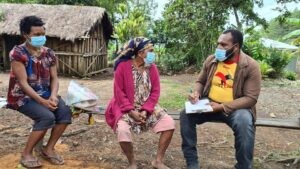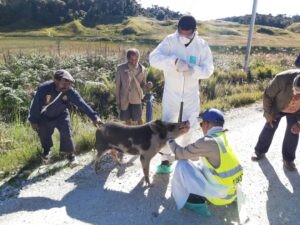An African Swine Fever (ASF) assessment has commenced in Papua New Guinea (PNG) to evaluate the impact of ASF emergency response work in declared disease areas.
In the declared disease areas, approximately 143,000 households own over 719,000 pigs, and ASF poses a significant economic and cultural threat to these communities
The assessment, conducted by enumerators funded by Australia and New Zealand supported PHAMA Plus and National Agriculture Quarantine and Inspection Authority (NAQIA) field officers, will see over 1,700 surveys completed with 500 different households in all districts of Southern Highlands, Enga and selected districts of Jiwaka and Western Highlands Province.


NAQIA’s Chief Veterinary Officer Dr Ilagi Puana says the exercise will provide useful quantitative and qualitative data as well as socio-economic indicators that will assist in the long-term management of ASF.
“This impact assessment assists our surveillance efforts to define the extent of the disease, detect new outbreaks, and establish disease-free zones,” Dr Puana said.
“We continue to strengthen our containment and control around the infection sites so ASF does not spread beyond the Highlands. This is done by installing strategic road checkpoints leading into and out of the infected areas and preventing movement of live pigs and pork out of the infected areas to potentially uninfected areas of PNG.”
Interviews with the 500 selected pig farming households will be undertaken at least three times over a seven-month period, ending in August 2021. This includes one face-to-face interview by the field teams and subsequent surveys via telephone over the study period.
PHAMA Plus PNG Country Manager Sidney Suma said the exercise has a strong gender-focus in order to capture impact of ASF response activities on women, youth and people living with disabilities.
“Our field survey teams will ensure the approach to data collection is appropriate to enable data collection from both men and women, with a target of 50 percent gender split,” Mr Suma said.
“Outbreaks of ASF in PNG will disrupt the livelihoods of livestock keepers, household producers, commercial farms and services providers along the value chain. PHAMA Plus continues to support NAQIA in its response efforts, addressing economic losses, restoring confidence among pig owners, and addressing gender and social challenges.”
The study commenced in areas where NAQIA has existing ASF response measures in place and has previously done work on awareness, containment measures and delimiting surveillance. The field survey team collected samples from villages with ASF and neighbouring villages where the disease is not detected, for comparison.
NAQIA continues to implement its response to the outbreak of African Swine Fever.
The response aims to confine the disease to the declared diseased areas of Southern Highlands, Enga, and Hela in the upper Highlands. However, the disease has recently been detected in isolated pockets in other Highlands provinces.
While minimal spread was detected in Western Highlands (WHP) and Jiwaka provinces in December 2020, results from further surveillance of the area in January and February 2021 indicate active infection and spread within WHP and Jiwaka Provinces. Two further isolated cases were also detected in Chuave District, Chimbu Province.
As part of this work, reports of sick or dead pigs within and outside the declared disease area are promptly investigated using stringent biosecurity protocols by NAQIA animal health inspectors and technical personnel on the ground. ASF is a serious pig disease that has spread from Africa across the world and is now in Papua New Guinea (PNG).
If you are in PNG, please assist eliminate ASF by calling the toll-free number (180 1332) to report any sick or dead pigs.
-ENDs-
For more information, please contact PHAMA Plus Country Manager (PNG), Sidney Suma on s.suma@phamaplus.com.au
